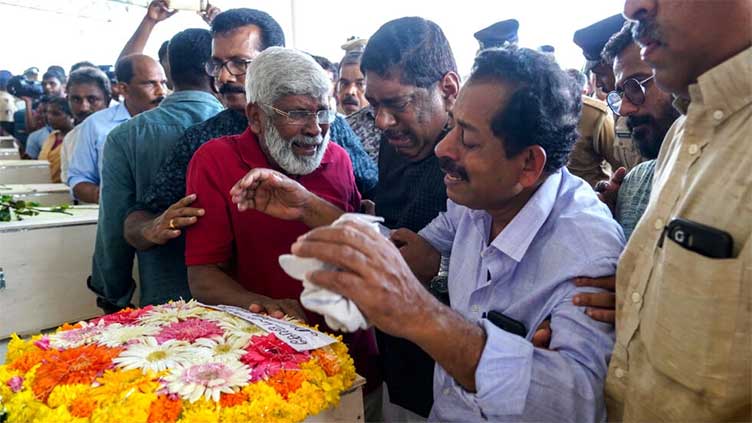Indian relatives grieve as bodies of 45 Kuwait fire victims return

World
Fifty people died in the inferno, 45 of them Indians, with dozens more hospitalised
KOCHI (AFP) – Grieving families kept a solemn vigil in the terminal of an Indian airport on Friday as the bodies of dozens of migrant workers killed in a Kuwait building fire returned home.
Wednesday's dawn blaze quickly engulfed a housing block home to foreign labourers servicing the oil-rich gulf state's economy.
Fifty people died in the resulting inferno, 45 of them Indians, with dozens more hospitalised and anguished relatives back home frantically chasing news of whether their loved ones had perished.
"We held on to hope till the last minute that maybe he got out, maybe he's in the hospital," Anu Aby, the neighbour of 31-year-old victim Cibin Abraham, told AFP.
Aby said Abraham had been due to return to his home in Kerala state in August for his child's first birthday.
Abraham had been on the phone to his wife just an hour before the fire began, he said.
Others sat in a waiting area at Kochi airport in India's south, wiping away tears as the Indian Air Force plane carrying the remains of their relatives touched down.
"It is an unending loss for the families of the deceased," Kerala chief minister Pinarayi Vijayan told reporters at the airport.
"Measures need to be taken to prevent a recurrence of such an incident and it is hoped that the Kuwaiti government will take the requisite action."
Most of Kuwait's population of more than four million is made up of foreigners.
Many of them are from South and Southeast Asia working in construction and service industries and live in overcrowded housing blocks such as the one that went up in flames on Wednesday.
Rights groups say that migrant workers in Kuwait are vulnerable to abuse and exploitation because of the "kafala" sponsorship system, which ties their visas to their employers.
Human trafficking, low wages, poor conditions and physical and sexual abuse are all risks for foreign workers.
The Philippines halted the deployment of new domestic workers to Kuwait last year after the body of a Filipino housemaid was found in the desert.
'Let's pray for them'
The blaze was one of the worst seen in Kuwait, which borders Iraq and Saudi Arabia and sits on about seven percent of the world's known oil reserves.
Nearly 200 people were living in the building and many of the dead suffocated and the injured suffered smoke inhalation after being trapped by the flames, according to a fire department source.
The bodies of many of the dead were charred beyond recognition and needed to be formally identified through DNA testing before they were repatriated.
One Kuwaiti and two foreign residents have been detained on suspicion of manslaughter through negligence of security procedures and fire regulations, authorities in the Gulf state said Thursday.
Interior Minister Sheikh Fahd Al-Yousef vowed on Wednesday to address "labour overcrowding and neglect" and threatened to close any buildings that flout safety rules.
Three Filipinos were also among the dead, with the country's migrant workers secretary Hans Leo J. Cacdac saying authorities were organising their own return efforts.
"The priority at this stage is the repatriation of human remains," he told a news briefing in Manila on Friday.
Two more Filipinos were in intensive care after the fire.
"Let's pray for them," Cacdac said. "They are in critical condition."


